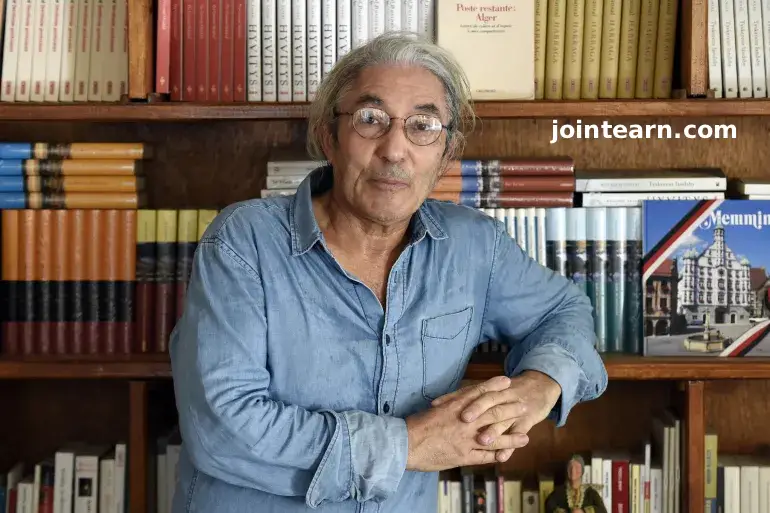
Algerian President Abdelmadjid Tebboune has granted a presidential pardon to acclaimed French-Algerian writer Boualem Sansal, who was serving a five-year sentence for “undermining national unity.”
The 81-year-old author’s release follows a formal appeal from Germany on humanitarian grounds, ending a year-long detention that had drawn international criticism and strained Algeria’s relations with several European nations.
Humanitarian Pardon for Boualem Sansal After German Intervention
In an official statement released by the Algerian presidency on Wednesday, November 12, 2025, President Tebboune confirmed that he had accepted a request from German President Frank-Walter Steinmeier to pardon Sansal.
“President Tebboune has granted a pardon to Boualem Sansal after a request from his German counterpart, citing humanitarian reasons,” the statement read.
The author, who suffers from health issues, is expected to be transferred to Germany for medical treatment following his release. The pardon represents a rare diplomatic concession from Algeria, signaling a possible thaw in relations with Germany after months of quiet negotiations.
Who Is Boualem Sansal?
Boualem Sansal, born in 1944, is one of North Africa’s most influential francophone writers, celebrated for his novels that explore themes of identity, religion, colonial history, and the modern Algerian state.
A retired engineer and former civil servant, Sansal turned to literature in the late 1990s, publishing critically acclaimed works such as Le Serment des Barbares and 2084: The End of the World — a dystopian critique of authoritarianism and religious extremism.
Over the decades, Sansal has been an outspoken critic of Algeria’s political establishment, often challenging corruption, censorship, and what he views as the erosion of individual freedoms. His novels have earned him numerous international literary prizes but have also placed him at odds with authorities at home.
Arrest and Sentencing: “Undermining National Unity”
Sansal’s legal troubles began in November 2024, when he was arrested after giving an interview suggesting that France had transferred Moroccan territory to Algeria during the colonial era — a remark that Algerian officials deemed an attack on the country’s sovereignty.
In March 2025, an Algerian court sentenced him to five years in prison under anti-terrorism laws, citing “undermining national unity” and “spreading false information.”
The author denounced the charges as politically motivated. “Are we holding a trial over literature?” Sansal asked during a hearing in June. “Where are we headed if words and ideas have become crimes?”
Human rights organizations and international PEN groups quickly condemned his imprisonment, calling it part of a broader campaign to silence dissent.
Family’s Relief and Germany’s Diplomatic Role
Following the announcement of the pardon, Sansal’s daughter, Sabeha Sansal, expressed deep relief.
“I’m overjoyed and grateful that my father will finally be free,” she told AFP. “I hope to see him soon and that he will receive the medical care he needs.”
While France had previously appealed for leniency, Algeria appeared more receptive to Germany’s intervention. According to diplomatic sources, Steinmeier personally reached out to Tebboune, referencing their “longstanding personal relationship” and emphasizing the humanitarian dimension of Sansal’s case.
Tense Algeria–France Relations and the Western Sahara Issue
Sansal’s detention added to the growing rift between Algeria and France, whose relations deteriorated sharply after Paris formally recognized Morocco’s sovereignty over Western Sahara in mid-2025.
Algeria, which supports the independence-seeking Polisario Front, viewed France’s shift as a betrayal, further straining diplomatic and economic ties.
The Sansal affair only deepened the mistrust, with Algiers rejecting several French appeals while positioning Germany as a more neutral mediator.
Crackdown on Dissent in Algeria
Sansal’s imprisonment is part of what activists describe as a widening crackdown on free expression in Algeria.
Since the 2019 Hirak pro-democracy protests, the government has increasingly invoked anti-terrorism legislation to target journalists, poets, and political activists.
Just this week, Algerian poet Mohamed Tadjadit, known for his stirring recitations during the Hirak movement, was sentenced to five years in prison for “condoning terrorism.”
International organizations, including Amnesty International and Human Rights Watch, have denounced the charges as “baseless” and called for his release.
International Calls for Press Freedom Continue
Algeria also faces criticism for the ongoing detention of French sports journalist Christophe Gleizes, who was convicted in June 2025 for “glorifying terrorism.”
According to Le Monde, Gleizes had been communicating with a football official in the Kabyle region linked to a banned nationalist group — allegations that press freedom groups say were exaggerated.
Reporters Without Borders (RSF) has urged Algiers to release Gleizes, stating he is “guilty only of practising journalism and loving Algerian football.”
Boualem Sansal’s Legacy and Future
Boualem Sansal’s release marks a potential turning point for literary freedom and international diplomacy in Algeria.
Though frail, the author’s influence remains significant across the francophone world. His novels — often banned or censored in Algeria — continue to spark debate about history, religion, and democracy in the Arab world.
For many, Sansal’s pardon represents not only a humanitarian gesture but also a symbolic moment for artistic freedom in a country where dissent still carries heavy risks.
🕊️ Key Takeaways
- Pardoned: Boualem Sansal, 81, released from Algerian prison.
- Reason: Humanitarian grounds following German intervention.
- Sentence: Five years for “undermining national unity.”
- Transfer: To Germany for medical treatment.
- Significance: Reflects ongoing tensions between Algeria, France, and Germany.


Leave a Reply